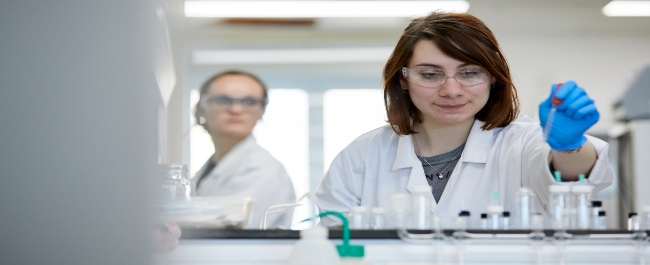World-leading population-based research studies: the Pfizer Vaccine Centre of Excellence
The Pfizer Centre of Excellence for Epidemiology of Vaccine-preventable Diseases opened at Bristol in May 2021.
Real-world population-based surveillance studies
Using an initial investment of £4.6 million from Pfizer, the centre is conducting real-world population-based surveillance studies in hospitals and the community, to identify and measure the burden of specific vaccine-preventable infectious diseases affecting adults and children.
Research will also be undertaken to support the design, development and use of next-generation vaccines.
The centre, which is the first of its kind in the UK and only the second to launch to across the world, is led by Adam Finn, Professor of Paediatrics at Bristol, Director of the Bristol Vaccine Centre at Bristol Medical School and lead of Bristol UNCOVER (Bristol COVID Emergency Research Group).
At the start of the pandemic, University of Bristol virologists Dr Andrew Davidson and Dr David Matthews were the only team in a UK university working with 'live' human coronaviruses of concern.
They were the first UK team to publish research using the live human SARS-CoV-2 virus in a controlled lab just five weeks after receiving the virus from Public Health England.
Outputs and outcomes
Initially, the centre will conduct several population-based surveillance studies of pneumococcal disease, Clostridium difficile and respiratory syncytial virus (RSV).
AvonCAP (community acquired pneumonia), an ongoing surveillance project, records detailed information on every adult patient admitted to Bristol’s two large NHS hospitals with symptoms, signs and/or X-ray evidence of acute disease in the lungs.
The study aims to report an overall incidence of acute respiratory disease, as well as incidence of conditions like asthma and chronic obstructive pulmonary disease (COPD) that need inpatient treatment.
In addition, AvonCAP will provide accurate estimates of the burden of disease which is vaccine-preventable, including from infections such as COVID-19, pneumococcus and respiratory syncytial virus (RSV).
The AvonCAP study recently published an estimate of the effect of one dose of COVID-19 vaccination in preventing hospitalisation in older adults, and continues to provide analysis of vaccine effectiveness, disease severity and incidence following the emergence of COVID-19.
AvonCAP GP2 is a sister study to the AvonCAP hospital study and aims to identify adults diagnosed with chest infections, worsening of heart failure, asthma, or COPD, who are seen within primary care (either at their GP practice or by the Bristol out of hours GP service).
The study aims to estimate the incidence of acute respiratory disease in adults in primary care. The information collected will also help to understand how many of these illnesses could be prevented by vaccinations and what groups of patients might benefit most from vaccination.
Patients will be recruited from six GP practices representing the different demographics of the wider Bristol population:
- Concord Medical Centre
- Courtside Surgery
- Montpelier Health Centre
- Pioneer Medical Group
- Tyntesfield Medical Group
- Wellspring Surgery
